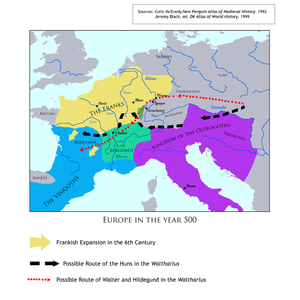Waltharius513
Revision as of 22:49, 7 December 2009 by Michelle De Groot (talk | contribs) (→Gunther and his companions approach Walther’s camp; Hagen unsuccessfully tries to dissuade the king from attacking it (513–531))
Gunther and his companions approach Walther’s camp; Hagen unsuccessfully tries to dissuade the king from attacking it (513–531)
| Ast ubi Guntharius vestigia pulvere vidit, | Georgics 3.171: summo vestigia pulvere signent. ‘Let them print their tracks on the surface of the dust.’ Statius, Thebaid 6.640: raraque non fracto vestigia pulvere pendent. ‘The rare footsteps hover and leave the dust unbroken.’
|
DDSDDS | ||||
| Cornipedem rapidum saevis calcaribus urget, | Prudentius, Psychomachia 253-254.: talia vociferans rapidum calcaribus urget/ cornipedem. ‘Thus exclaiming she spurs on her swift charger and flies wildling along with loose rein.’ Statius, Thebaid 11.452-453.: saevis calcaribus urgent/ immeritos. ‘With savage goads they incite their innocent teams.’
|
DDSSDS | Cornipedem: horse (literally, horn-foot). The hoof was considered to be made of horn similar to the material of an antler. Cato (TK) and Virgil (Georgics 3.88) both use the word of hooves; interestingly, in was also applied to birds' beaks, warts, and even, according to Pliny, skin over the eye. MCD | |||
| Exultansque animis frustra sic fatur ad auras: | 515 | Aeineid 2.386: exultans animisque. . . ‘Flushed with courage. . .’ 11.491: exsultateque animis. ‘He exults in courage.’ 11.556: ita ad aethera fatur. ‘He cries thus to the heavens.’
|
SDSSDS Elision: exultansque animis |
|||
| Accelerate, viri, iam nunc capietis euntem, | DDSDDS | |||||
| Numquam hodie effugiet, furata talenta relinquet.' | Furata: passive in sense, though from a deponent.
|
Eclogue 3.49: numquam hodie effugies. ‘This time you won’t get away!’
|
DDSDDS Elision: H-ELISION: numquam hodie; hodie effugit |
|||
| Inclitus at Hagano contra mox reddidit ista: | DDSSDS | |||||
| Unum dico tibi, regum fortissime, tantum: | SDSSDS | |||||
| Si totiens tu Waltharium pugnasse videres | 520 | Videres equiv. to vidisses
|
DSDSDS | |||
| Atque nova totiens, quotiens ego, caede furentem, | Aeineid 2.499-500.: vidi ipse furentem/ caede Neoptolemum. ‘I myself saw Neoptolemus, mad with slaughter.’ 8.695: arva nova Neptunia caede rubescunt. Neptune’s fields redden with strange slaughter.’ 10.514-515.: te, Turne, superbum/ caede nova. . . ‘You, Turnus, still flushed with fresh slaughter. . .’
|
DDDDDS | ||||
| Numquam tam facile spoliandum forte putares. | SDDSDS | |||||
| Vidi Pannonias acies, cum bella cierent | Aeineid 1.541: bella cient. ‘They stir up wars.’ Statius, Thebaid 11.487: cum bella cieret. . . ‘When he made war. . .’
|
SDDSDS | ||||
| Contra Aquilonares sive Australes regiones: | Aquilonares equiv. to Aquilonias
|
DSSSDS Elision: contra Aquilonares; sive Australes |
||||
| Illic Waltharius propria virtute coruscus | 525 | SDDSDS | ||||
| Hostibus invisus, sociis mirandus obibat: | Aeineid 6.167: lituo pugnas insignis obibat et hasta. ‘He braved the fray, glorious for clarion and spear alike.’
|
DSDSDS | ||||
| Quisquis ei congressus erat, mox Tartara vidit. | Aeineid 6.134-135.: bis nigra videre/ Tartara. . . ‘Twice to see black Tartarus. . .’
|
DSDSDS | ||||
| O rex et comites, experto credite, quantus | : Aeineid 11.283-284.: experto credite quantus/ in clipeum adsurgat, quo turbine torqueat hastam. ‘Trust one who has experienced it, how huge he looms above his shield, with what whirlwind he hurls his spear.’
|
SDSSDS | ||||
| In clipeum surgat, quo turbine torqueat hastam.' | : Aeineid 11.283-284.: experto credite quantus/ in clipeum adsurgat, quo turbine torqueat hastam. ‘Trust one who has experienced it, how huge he looms above his shield, with what whirlwind he hurls his spear.’
|
DSSDDS | ||||
| Sed dum Guntharius male sana mente gravatus | 530 | Aeineid 4.8: male sana. . . ‘Much distraught. . .’
|
SDDSDS | |||
| Nequaquam flecti posset, castris propriabant. | Propiabant equiv. to appropinquabant
|
SSSSDS |
